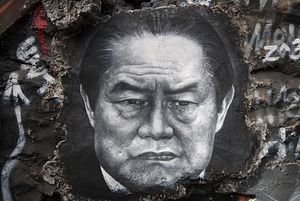With the rumors still swirling about former Politburo Standing Committee member Zhou Yongkang being under investigation, and the news that one of his protégés, Ji Wenlin, currently Vice Governor of Hainan province, is facing an anti-corruption probe, it’s a good time to think about what the political rather than the administrative meaning of this all might be. Gunning for a retired elite politician is unprecedented in China, and would seem on the surface to be a high risk strategy. Xi and those advising him must have made a calculation that the risk is worth it. What are they after?
In his novel The Civil Servant’s Notebook (recently translated into English), Wang Xiaofang draws on his experience as private secretary to a provincial deputy Party Mayor. In Wang’s case, this was Ma Xiangdong, who was sentenced to death in the early 2000s for gambling away millions in public money in Macau. Wang’s novel has a fairly black-and-white moral agenda. The good are shining, the bad irredeemably evil, and in the end everything is righted and justice prevails. But the novel is more striking for the delicate way in which this insider account describes the networked world of Chinese politics and the myriad links between people. In the novel, Party Secretary Liu Yihe is ranged against his corrupt deputy Peng Guoliang. Each of them has links into different areas of the government and the Party apparatus. An attack on either is an attack on these separate networks. Peng’s network finally leads right to the political center in Beijing. But Peng’s patrons in the capital calculate that he is expendable, and do nothing when he is finally thrown to the discipline inspectors. Peng ends up executed, his wife imprisoned, and those around him either swiftly change their allegiance or sink with him.
The novel makes clear that the key skill at this level of Chinese politics is to survive to fight another day. And for that, intuition is important. Knowing when to jump ship before disaster happens, as Peng’s secretary manages to do, is critical. It is clear in Wang’s vision of the Chinese political world that morality is a stranger from another country. The key currency is power — keeping close to the networks that have it, and as far away as possible from those that are losing it.
In the case of Zhou Yongkang, it is clear that power was ebbing away from him even at the time of Bo Xilai’s fall in early 2012. The Financial Times reported that he had gone missing for several days during the crucial period when Bo had been removed from his Party positions and placed in detention. He has barely been seen since retiring late in 2012. His son and other intimates have been taken in. It looks ominously like a highly surgical attack on the networks around Zhou, with their links to the amazing cash-making powers of the state petrol sector where Zhou started his career and which had been his main fiefdom for patronage.
Xi Jinping may be mandating this because, for him, Zhou Yongkang and his allies are first of all expendable. They showed disloyalty during the leadership transition and backed the wrong horse. But they also showed that, for them, the Party is a means to material gain and feathering their own nests, rather than governed by some higher political and moral purpose. For Xi, who has long said that officials should not seek vast fortunes, Zhou is the unvarnished enemy, someone who has evidently used the Party to create his own power base to protect the riches accrued by his network. Symbolically, decapitating Zhou is good domestic politics. It shows, against a largely helpless antagonist, that Xi is serious. Politically too it makes the world around Xi a little less complicated.
As Wang Xiaofang’s novel makes clear, these battles are usually ones of attrition. It is likely there will be many moves in the days and months ahead, and it is possible that Zhou himself will be left alone, albeit isolated and largely under an informal type of house arrest. His fate rests on the calculations in the head of one man – Xi. Xi must decide if the value of finally reining Zhou in, and humiliating and prosecuting him, is worth it. If Xi thinks it is, then there is no reason to doubt that Zhou will be thrown to the dogs as ruthlessly as Bo Xilai was. Chinese politics is not a place for the sentimental. And Xi may well choose Zhou to make clear that he is no softy.

































